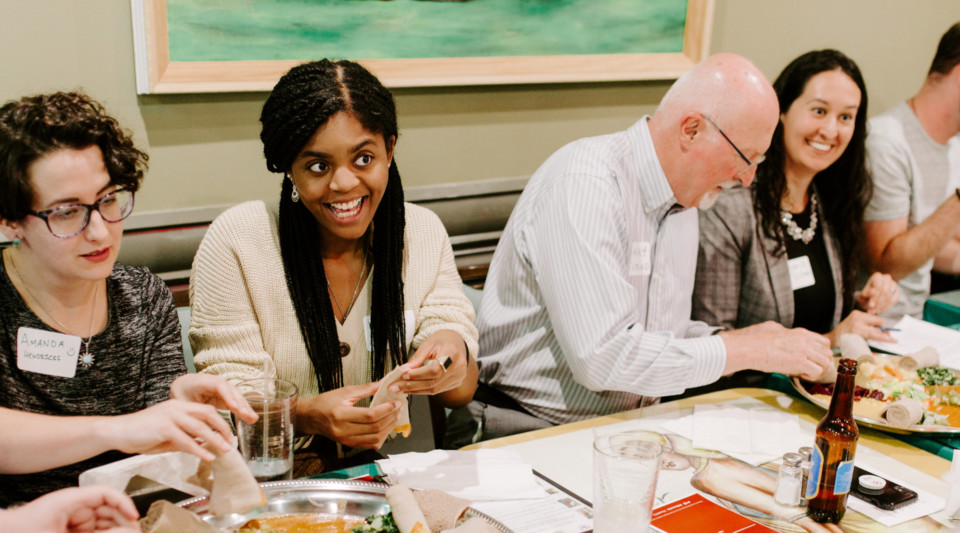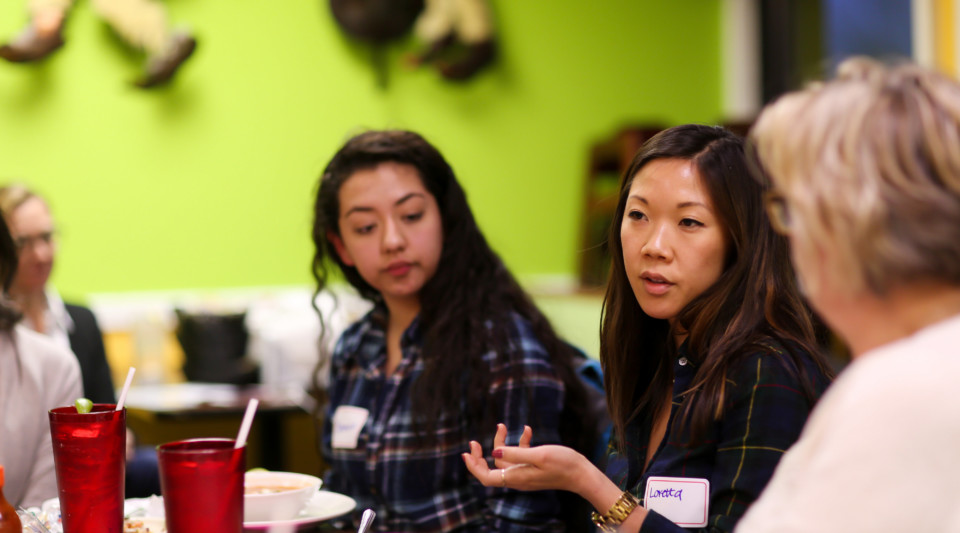
Chew on This
Chew on This discussions are held in multiple locations (usually restaurants) and are led by a moderator who is knowledgeable about the topic. Attendees choose their location and are treated to an informative, engaging conversation with up to a dozen other strangers or friends. It’s the ultimate dinner party!
Topics have included: “what divides us?”; “how we know what we know?”; “will robots replace us?”; and conversations related to ethnic identity and food.
Additional Program Details
Upcoming Events
Chew On This: What’s your Recipe for Community?
Food is fundamental to both our lives and relationships. We organize our days around meals and relationships around gatherings that commemorate milestones. Whether these are the daily gatherings around the kitchen table, or the yearly traditions of holidays and celebrations, food is often the centerpiece of the day and what we serve matters. How does food connect you to community, family, and history? What food traditions do you and your community hold and why? How does food connect you to communities other than yours, building bridges at the table? Can food serve to build and maintain community?
Join Indiana Humanities on Thursday, Oct. 17, as we ask the question, “What’s your recipe for community?” during a special Unearthed-themed Chew on This. Sign up for one of four locations around the state where you’ll share a meal from a local restaurant and a fun, insightful conversation with other curious Hoosiers. Each table will be led by a knowledgeable facilitator, someone to help us grapple with questions about how food acts as a convener in our lives and relationships. Your ticket price includes your meal and an unforgettably engaging experience.
Events
Chew on This: Why Does Local Reporting Matter?
Local journalism is under threat. The business model of ad-supported print media has collapsed. News is consolidating, journalists are getting laid off, and reporters are being asked to do more with less. No one knows a community like the local reporters, yet there are fewer of them every day.
How do you get your news? How often do you seek out—and pay for—local reporting? What kind of stories are or aren’t told when we lose local journalists? What’s the connection between thriving local media and a healthy, engaged community? How do journalists make decisions about where to put to their focus, and what do they really think of the comments section? Indiana journalists facilitated this statewide conversation, which took place virtually.
Chew on This: Who Belongs Here?
In literature and pop culture, Midwesterners are sometimes depicted as friendly and hospitable, while at other times we’re seen as closed-minded and suspicious of newcomers and immigrants. To put it another way, sometimes we’re Leslie Knope, rolling out the welcome wagon, and sometimes we’re the townspeople in Hoosiers, turning a cold shoulder to the new guy and skeptical of his new ideas.
What’s the reality of the community where you live—are you more of a Pawnee or a Hickory? How welcoming is your community to people who come from somewhere else, whether another country or just over the county line? What do we mean when we say someone is or isn’t part of a community? Who decides? Why does openness matter—and how can your community be more welcoming? We held this statewide conversation in seven cities and ten restaurants.
Chew on This: What Divides Us?
Sometimes it feels as if we’re coming apart at the seams. The conclusion drawn from the near-constant polling, media commentary and academic analysis of the last few years is that Americans are polarized—divided along geographic lines or by race, by generation or by socio-economic status.
Historians Kevin Kruse and Julian E. Zelizer say it all goes back to 1974, when Watergate, the end of the Vietnam War and anti-busing riots were among the many crises that rocked America. Journalist Bill Bishop, working from reams of sociological and political science data, says we started to sort ourselves into camps in 1965—between June and October, to be exact. Others go back to the 1920 census, the first to show that the majority of Americans lived in cities and towns, rather than rural areas. We held this statewide conversation in nine cities and ten restaurants.
Chew on This: Will Machines Replace Us?
When’s the last time you spoke to a teller at your bank? To a travel agent? When you go to the grocery, how often do you have an actual cashier check you out? We see the effects of automation all around us, from service and manufacturing, to the legal profession and trucking. Though only 6 percent of adults report losing hours or a job to automation, according to the Pew Research Center, another report by McKinsey Global predicts that 400 million jobs will be displaced by automation by 2030.
There’s no doubt that artificial intelligence and robotics are relieving workers of some kinds of repetitive, tedious and maybe even back-breaking labor. What may be less clear is what new jobs will arrive to provide income and a sense of purpose for those displaced by technology. Can new jobs be generated to replace those that are displaced? Is automation safe? Can we imagine income without work—and if so, what will we do with all this new free time? We held this statewide conversation in five cities and seven restaurants.
Chew on This: Are We Our Data?
The advent of powerful computers means it’s possible to track and analyze so many human behaviors—what we read and say online, where we drive or walk, what we purchase, who we talk to, and more. The possibilities are exciting—better targeting healthcare interventions to the people and places that need them most, uncovering evidence of a criminal conspiracy and preventing it before it happens, even the serendipitous delight of a great suggestion for what to read next on your Amazon page or Twitter feed. But there are no shortage of concerns about privacy and consent, about ownership and profit off our personal data. We held this statewide conversation in four cities at six restaurants.
Chew on This: Are You Sure?
How do we know if something is true? What counts as evidence? How we answer these questions as individuals and as a society affects the choices we make—everything from how we read the news and vote, to how we choose the foods we eat and make healthcare decisions, to how our leaders set policy for the economy, the environment and more. We held this statewide conversation in five cities and seven restaurants.
Chew on This: Latinos and The Next Indiana
Indiana is home to 314,501 immigrants, more than half of whom are from Latin America. In Indianapolis, the number of immigrants is on pace to double within the next 10 years. Attendees contributed to six simultaneous conversations around Indianapolis about the changing demographics of our community and the vital role Latino Hoosiers are playing in the future of Indiana education, business, arts and culture, and our shared civic life.
TMI: A #chewonthis for the cyber savvy generation
Kids between the ages of 13 and 17 joined us for a special Chew on This event for the cyber savvy generation at the Children’s Museum of Indianapolis. In small groups, teens had dinner and conversation—the face-to-face kind—about the pros and cons about texting, tweeting and other technology. The chat was informal, parents-free and led by a fellow teen.
Chew on This: Crossroads 1987
Indiana Humanities hosted a series of dinner conversations at ten venues around Indianapolis to discuss the success, failures and lasting impact of the Pan Am Games on its 25th anniversary. In the early 1980s Indianapolis was at a crossroads. Civic leaders boldly developed a vision that set the city on its path to becoming the Amateur Sports Capital of the World and turned its citizens into “professional” volunteers. Much like Super Bowl XLVI, the 1987 Pan Am Games put Indianapolis on the map.
Chew on This: Are We Being Good Ancestors?
Immunologist Jonas Salk, credited as inventor of the polio vaccine, was perhaps the first to articulate the question “Are We Being Good Ancestors?,” calling it the most important question we can ask ourselves. Knowing what we do about how current technologies and industries will change the environment long after we’re gone, Salk’s question raises a host of others. What will be humanity’s legacy? What do we owe to future generations? How do we make decisions today with consideration to the inhabitants of an unknown future?
Program Highlights

Our Favorite Tweets from Chew on This: Are We Our Data?
During Chew on This we place "Tweeters" at each dinner table to capture highlights from the conversation. See some of the best Tweets from Chew on This: Are We Our Data?
Read moreQuestions?
Contact Megan Telligman, Director of Programs:
mtelligman@indianahumanities.org | 317.616.9409